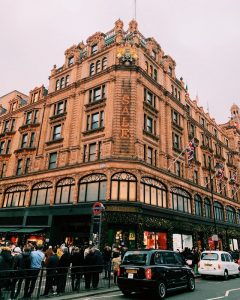 What Is The Future Of Retail Amid The High Street Bloodbath
What Is The Future Of Retail Amid The High Street BloodbathThe future of retail is obvious, more store closures and a continued shift online as consumer buying habits change.
The threat to the UK high street has been coming for many years. This is nothing new, however COVID-19 has caused the shift to quicken.
This decade we have seen the closure of some of the most iconic high street brands, not just small independent shops.
The future hints that more shops will close, more stores will be covered to apartments and a new retail era is pending
The retail sector has been with us thousands of years.
Shops of all kinds have been in Britain since before the Romans arrived, and buying habits have changed with the times. People selling shoes, selling clothing, selling fresh fish, selling bread, buying and selling is what currency is there for.
Coming more into the modern times, we have seen a gradual decline in our high street since the 1990’s as our society has evolved.
The 1960’s saw the well known shopping centre appear which has taken focus off of the high street.
Supermarkets started appearing around the same time, taking business away from the local butcher or the local fishmonger. Now you can get anything from under one roof without the trouble of battling the weather as you go from shop to shop.
Now we have seen the growth in online shopping. You do not need to go to the supermarket any more, you can order it online, and often you get more choice when buying online.
This really took off after the lockdowns of 2020 when many shops were closed, people turned to websites like Amazon to get things delivered, often without charge.
Now this has become a way of life for us, we have got into the habit. Our passwords are stored as are our payment details and we save a lot of time not having to travel or go from aisle to aisle hunting down bargains.
We have lost many of the big brand names, the most iconic is Debenhams, with roots going back to 1778.
Some brands you may recognise would be:
These are just a few of the well known brands that we have lots over the past couple of years, again, the pandemic was not responsible but did not help.
Many smaller businesses have also had to close, due to a change in shopping habbits.
The bloodbath has not ended yet, many more iconic brands (such as Jessops owned by Dragons Den star Peter Jones at PJ Investments) are at risk.
The government did support many businesses during the pandemic, however the future does not look good even as lockdowns are eased.
The myth that consumers prefer to do online shopping rather than high street shopping is untrue. Equally the myth of reduced consumer spending is also untrue, since we live in a consumerist society.
Retail therapy is very popular still, friends going out, doing some shopping, getting lunch and then hitting the shops again.
So why is it that there is a decline in the high street?
In order to understand the present, we need to look into the past, where shopping in the UK came from.
Back in the pre-war days, shopping centres did not exist. The high street was a plethora of independent stores. Greengrocers, butchers, hat shops, tie shops, shirt shops, shoe shops, sweet shops etc.
When supermarkets (like Morrisons) started in the UK in 1948, this was the start of the decline of the traditional high street. Butchers closed, greengrocers closed as shopping was centralised. Sanisbury’s can trace its history back to 1869.
Shopping centres followed in the UK after the concept came over from the US, the first apparently being Brent Cross as the first out of town shopping centre.
We all love going to the small independent shops, shops that are not part of a brand, but sell bespoke products.
This could be a toiletry shop selling organic bath products, candles and reed diffusers. It could be a shop selling cashmere jumpers and winter clothing.
These kind of shops exist in our major cities such as Edinburgh, London and Birmingham but they need to get footfall.
Marketing for shops sadly will not turn back the wheels of time, or create a change in consumer habits. People still like going shopping, however shops are now such large machines, that footfall has to be very high and spending per head needs to balance against overheads.
Choosing a marketing company that understands retail is important.
Marketing can help, but will not be the magic bullet. The future of retail looks set to be shifting again, away from the modern shopping centre to something else.
People still like retail therapy, but the shopping centre has shown a decline as the traditional high street has done. Many shopping centres have empty units, some towns are looking to convert the near empty shopping centre into flats.
Shops like Amazon will continue to grow, but it is not a shopping experience, just a quick way to order anything and everything.